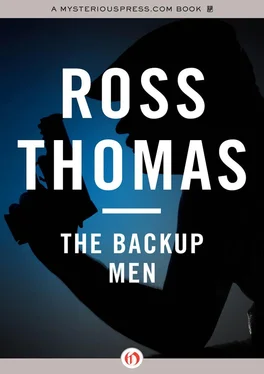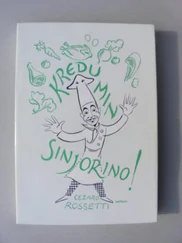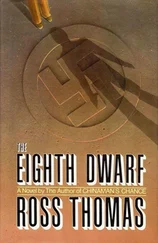“Yes,” the king said, “it’s clear.”
“Did Harold Clegg recommend the Gothars and suggest that you retain my services? And did Clegg also recommend Padillo?”
“I didn’t retain anyone,” the king said in a whisper so low that I could barely hear it. “I don’t know any Harold Clegg.”
“Did Scales?”
“I don’t know.”
There was a thud or a thump that was followed by a high-pitched scream. I assumed that Kragstein had kicked the king. “I don’t know!” he screamed.
“It was Clegg,” Scales said in a dull, resigned tone. “He recommended the Gothars and also Padillo. I used another intermediary to get him to recommend you, but Clegg didn’t know it.”
“It’s pretty, isn’t it?” Padillo said. “We’ve all been working for the same boss. You’ve been trying to kill him and we’ve been trying to keep him from getting killed and he picks up the tab for both operations.”
“I had nothing to do with it,” the king said. “Nothing.”
“Not much,” Padillo said. “How large a slice of the five million did they offer you, twenty percent?”
“Ten,” Kragstein said.
“That’s because they didn’t need us anymore. But even if they didn’t need us, there was still the chance that you’d kill them. So they decided to buy you off. It could have worked if the king weren’t such a rotten actor. Why do you think they really hired you, Kragstein?”
“I still don’t know that they did.”
“Ask Scales. Ask him hard.”
There was another thud that was followed by a moan. This time it must have been Scales who got kicked. I was growing tired of leaning spreadeagled against the wall so I started to shift my hands. Something dug into my kidney hard enough to hurt and Gitner said, “Don’t.”
“Why did you hire us through an intermediary, Scales?” Kragstein said.
The pain was evident in his voice, but nevertheless Scales tried to lie. He wasn’t good at it and he seemed to know that he wasn’t, but he tried anyway. “It was a mistake. I didn’t—”
Kragstein didn’t want to hear about any mistakes. “You tell it, Padillo. Your version.”
“Fine,” Padillo said. “Suppose you were visiting royalty who wanted to travel across the country incognito. First, you’d have to get the State Department off your back. Then you’d have to avoid representatives of your own country. So you hire yourself an assassin, an international hit man. Better yet, you hire yourself a pair of them through an intermediary. That gives you the reason for traveling incognito. But because you don’t want to die, you also hire yourself a couple of topflight bodyguards and just to make sure that nothing’s really going to happen to you, you make them hire a backup man—me. If Washington offers you official protection, you turn it down with the claim that you’re convinced that it’s either incompetent or because it can be corrupted—and you cite the deaths of the Kennedys and King to prove your point. How does it sound so far, Kragstein?”
“I’m still listening.”
“It’s a gamble, of course. You have to make the threat real. So you actually bet your life that the crowd you hired to protect you is better than the bunch that you hired to kill you: If you win, you win five million dollars.”
There was a silence. Finally, Kragstein said, “When did you find out, Padillo?”
“It didn’t come to me in a dream. The king kept making mistakes. Little ones. They began to add up.”
There was another silence. I wanted to say something, to venture an incisive comment perhaps, but nobody asked what I thought. They probably didn’t care.
The silence kept on growing until Kragstein said, “Who else knows?”
“Only one other person.”
“Knows what, for Christ’s sake?” Gitner said.
“Padillo’s right, Gitner,” Kragstein said. “You are dumb.”
“Small words,” Gitner said. “Use small words and maybe I’ll understand. Only one other person knows what?”
I could hear Kragstein sigh. “That the king’s not really a king. He’s a ringer.”
“Ah, shit,” Gitner said.
“You said somebody else knows, Padillo. Who?”
“You don’t have to worry about him.”
“Why?”
“Because he’s dead. Because the king killed him.”
I caught her move. It was a bare, peripheral glance, but one moment Wanda Gothar was leaning against the wall next to me and a moment later she was gone and then there was a high-pitched scream. I could sense that Gitner had moved away so I turned around. She was trying to kill the king and she knew how to do it. Her right arm was around his neck and she had his head bent back at an almost impossible angle. The king flopped about on the floor, his hands clawing at Wanda’s right arm.
I glanced at Padillo. He wasn’t watching the battle. He was watching Gitner who wasn’t watching the battle either. He had moved to the door and stood there in a slightly crouched stance, his revolver aimed at Padillo’s stomach.
Kragstein moved in and aimed a hard, chopping blow at Wanda’s neck. She rolled away from it and it probably saved the king’s life because she loosened her hold and then lost it completely when Kragstein hit her again, aiming once more for her neck but catching the back of her ducked head.
She was up then and if her timing had been a little better, Kragstein would have been dead. Her left arm shot out, her knuckles clenched and extended. Kragstein ducked his chin, protecting his throat, and her blow smashed into his nose. The blood spurted once and then flowed down around Kragstein’s mouth and into his beard.
She was good, very good, and I understood why she was in the business she was in. She could have escorted me to the bank anytime. But she weighed only 120 pounds to Kragstein’s 180 or so and in fifty years he had learned a few nasty tricks which nobody had yet got around to teaching her.
He used one of them when he feinted a left at her head. It wasn’t much of a feint and she caught his fist with both of her hands and her fingers dug for the nerve between his thumb and forefinger. But instead of pulling back, Kragstein went with the blow and I saw his right hand move. It moved only six inches or so, but he got his shoulder into it. She saw it coming and tried to turn her left hip to it while digging even harder at the nerve in his left hand. Kragstein yelled but managed not to pull his right and it smashed into her low and knocked her back against the wall where she bent over and gasping, sank to her knees, her hands pressed to her lower abdomen.
Kragstein glanced quickly at the king and Scales and then turned toward Padillo and me. He now had his revolver out again.
“She almost had you,” Padillo said and smiled cheerfully.
“Almost,” Kragstein said, mopping at his bloody beard with a handkerchief. “You knew she’d try it, didn’t you?”
“Yes.”
“But Gitner wasn’t as dumb as you thought.”
Padillo shrugged. “Being careful doesn’t make him smart.”
“Being smart is my department, isn’t it?” He turned toward the king and Scales. The king was huddled up next to the wall, his hands clasped around the back of his neck. Scales was still seated, leaning against the wall, staring at nothing.
“Who is he?” Kragstein said to Scales.
Scales didn’t look at the king. He still stared blankly at nothing. Or he could have been watching his dreams disintegrate. “An actor,” he said. “An unemployed actor.”
“He’s from Llaquah?”
“Yes. I knew him there. Then he came to London. He wanted to be an actor. A second Omar Sharif. But he was not nearly good enough.”
“What happened to the real king?”
“He sent for me you know. He really did. When he came out of the monastery, he sent for me. He said he needed me. I came over from London. We were going out to dinner the third night I was there and he was taking a shower in the flat that he had borrowed. He slipped and broke his neck. It was an accident. A foolish accident.”
Читать дальше












